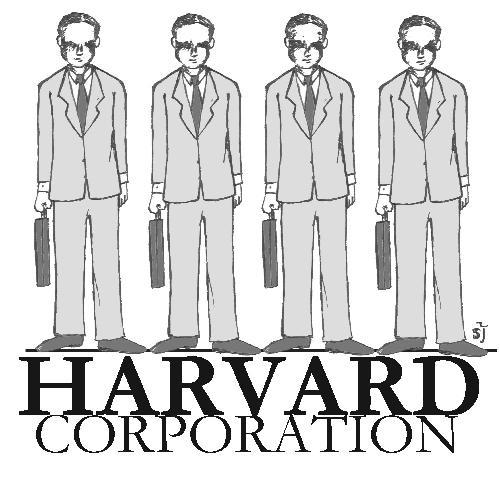
News
Summers Will Not Finish Semester of Teaching as Harvard Investigates Epstein Ties

News
Harvard College Students Report Favoring Divestment from Israel in HUA Survey

News
‘He Should Resign’: Harvard Undergrads Take Hard Line Against Summers Over Epstein Scandal

News
Harvard To Launch New Investigation Into Epstein’s Ties to Summers, Other University Affiliates

News
Harvard Students To Vote on Divestment From Israel in Inaugural HUA Election Survey
Making Harvard's Corporation Our Own

Following the resignation of Herbert S. “Pug” Winokur ’64-’65 from the Harvard Corporation amid controversy over his role as chair of the Enron finance committee, the Corporation appointed another businessperson tainted by the Enron fiasco.
Although Robert E. Rubin ’60 was not a direct employee of Enron, he was chair of Citigroup, Enron’s largest creditor and a defendant in a recent lawsuit brought by Enron shareholders. As secretary of the treasury under President Bill Clinton, Rubin exchanged friendly letters with Enron chair Kenneth Lay. When Enron’s finances started to slip, Rubin placed a now-infamous call to Peter Fisher, his former employee at Treasury, to seek assistance for the energy giant.
In fact, Rubin used his position at the treasury department to directly promote Enron’s business agenda. According to the Financial Times, when Enron wanted to build a power plant in Dahbol, India and the Indian government objected, Rubin interceded to help push the deal through. According to Human Rights Watch, the plant encountered such powerful opposition from the local population that Enron had to pay the local police to control protestors. Now, thanks in part to Rubin’s intervention, the plant is the largest in India.
Rubin’s and Winokur’s entanglements with Enron are symptomatic of more fundamental problems in the Harvard Corporation. Rubin represents the same corporate interests as the elites he is joining. He stands for the same logic behind Harvard’s heavy-handed expansion into Allston and its exploitation of the workers that sustain our community. Harvard is primarily an educational and research institution, and yet the people who govern it—with the exception of former University of Chicago President Hanna H. Gray—can hardly claim to be qualified as academics.
The man who Rubin replaces, Senior Fellow of the Harvard Corporation Robert G. Stone Jr. ’45, has recognized publicly that the Corporation needs someone from inside the academic community. Stone told The Crimson that, “We’ll probably be looking at what void there is on the Corporation, whether we need a scientist or an academician.”
But Rubin’s appointment does nothing to fill that void, and neither does it address the larger homogeneity that continues to plague the Corporation. Membership has been and continues to be associated with membership in the privileged elite of this country. Such privilege is intricately tied to racial, gender and class inequalities. It’s not surprising, then, that the Corporation has included only one person of color and two female members in its entire history. For Harvard to replicate this skewed system of power in its governance—despite its claims to promote diversity on campus—serves only to further such unjust distributions of privilege even beyond Harvard.
With the opportunity to appoint a new member to replace Winokur, the Corporation should relinquish a bit of its power and allow those affected by the decision—students, faculty, workers and alumni—to make the selection. A committee to select the new Corporation member should include representatives elected by each group. It should have binding decision-making power, rather than being yet another advisory group whose recommendations the University can summarily reject or significantly modify.
Beyond the issue of finding a replacement for Winokur, immediate changes in the Corporation’s procedures are necessary to demystify Harvard’s governance and make it just a bit more democratic.
The Corporation needs to be far more transparent in its day-to-day operations, and it should begin by releasing meeting times and locations and publishing meeting agendas and minutes. It should establish a formal grievance and appeals process to hear challenges to its decisions, and it should subject itself to the “visitation” process handled by the Board of Overseers. To make it easier to chart its progress and shortcomings, the Corporation should file a comprehensive annual report.
Ultimately, however, our university’s governance structure needs deep, long-term restructuring. To this end, an elected committee representing all members of the Harvard community should conduct a broad and critical review of Harvard’s governance. The decision-making structure, from top to bottom, should be accountable, responsive, representative and diverse.
Winokur’s resignation is an important first step. But for Harvard to ever truly be our university, we must have a voice in how it is governed. More Enron affiliates and out-of-state millionaires certainly do not help. Harvard should take the opportunity that Winokur’s vacancy presents to begin a process to open up the closed circles of power at the very top of the institution.
Emma S. MacKinnon ‘05 is a first-year in Canaday Hall. She is a member of HarvardWatch.
Want to keep up with breaking news? Subscribe to our email newsletter.
